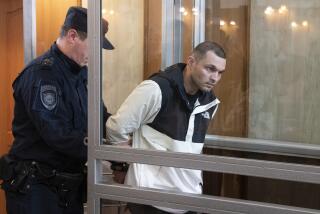Court-Martial Begins in Marine Spy Case : Espionage: Camp Pendleton corporal is accused of trying to sell secrets to an FBI agent posing as a Soviet agent.
- Share via
A general court-martial began Monday at Camp Pendleton to determine whether a Marine corporal tried to sell military secrets to the Soviet Union or was instead set up by the FBI.
Cpl. Charles L. Anzalone, 24, sat quietly in a small, stuffy courtroom while a charge of attempted conspiracy to commit espionage and other allegations were presented. Conviction could bring a maximum sentence of life imprisonment.
In opening statements, prosecutor Lt. Col. C. A. Ryan said Anzalone had contacted the Soviet Embassy last November and began a relationship with a woman in order to provide sensitive information about “national preparedness for war.”
However, the contact was discovered, and FBI Special Agent Jan Zawitkowski, posing as a Soviet KGB agent, met with Anzalone before he was arrested Feb. 12 as part of a joint probe by the FBI and the Naval Investigative Service.
Ryan also said Anzalone began an affair with another Marine’s wife in the hope of obtaining information from her to pass along to the phony KGB agent. Anzalone also has been charged with adultery.
Anzalone’s attorney, Capt. Paul McBride, claimed the defendant is no spy and had only “naively” called the embassy to ask whether the Soviet Union offers college scholarships to Americans.
In response to that call, the FBI contacted Anzalone and enticed him to provide information, McBride argued.
“The FBI did not catch a spy,” McBride said. “They created one. This is a case of entrapment, pure and simple.”
A key part of the five-hour court-martial proceeding was closed to reporters, and the details released Monday were sketchy. Camp Pendleton officials would not disclose which Soviet Embassy was contacted by Anzalone, nor how the FBI learned of the contact, how much money Anzalone may have received or what kind of information he allegedly tried to give.
What’s certain is that Anzalone, a native of New York, was a wireman serving with the Marine Wing Support Squadron 371 at the Marine Corps Air Station in Yuma, Ariz. He was formerly an air-traffic controller there.
The alleged offenses are said to have occurred between November and last February and include attempted conspiracy to commit espionage, failing to report contact with a citizen of a designated country, disclosing information to a person believed to be a foreign intelligence agent, using the mail to send unauthorized matter, adultery and possession and use of marijuana.
Anzalone has been confined in the Camp Pendleton brig since his arrest.
During the first day of his general court-martial, Anzalone pleaded not guilty to the charges. He elected to have the matter decided by a lone military judge rather than a five-member court.
Col. Charles Welch of the Sierra Circuit, Navy-Marine Corps Trial Judiciary is hearing the case, which is expected to last all week.
Fifteen government witnesses are scheduled to testify, but it was not known Monday how many defense witnesses would take the stand or whether Anzalone would testify in his own behalf.
Prosecutor Ryan said in his opening statement that Anzalone contacted the embassy twice in November and was called back by FBI agent Zawitkowski posing as the KGB operative.
As Ryan outlined it, Anzalone agreed to meet Zawitkowski, who gave his name as Mikhail, and the meeting was videotaped. At a meeting--it was not clear whether it was the initial meeting or a later one--Ryan said Anzalone provided some information and was offered $200.
When Zawitkowski asked him to sign a receipt, Anzalone appeared nervous but agreed. According to Ryan, “He said, ‘What the heck, you only live twice,’ signed the receipt and took the money.”
Another time, Zawitkowski allegedly gave the young Marine a list of information the Soviets supposedly wanted. In mid-February, Anzalone reportedly mailed an envelope containing manuals, maps and documents that included the guard schedules at the Yuma facility, according to Ryan.
In his opening statement, McBride said that Anzalone was merely interested in seeking a possible Soviet college scholarship, but was “aggressively pursued” by the FBI. “The agent made it very clear he wanted Cpl. Anzalone to commit espionage,” McBride said.
Anzalone’s defense relies on proving entrapment. But the case suffered a setback when Welch squelched a move to declare there could not have been espionage because the information exchanged was already available to the public.
More to Read
Sign up for Essential California
The most important California stories and recommendations in your inbox every morning.
You may occasionally receive promotional content from the Los Angeles Times.













